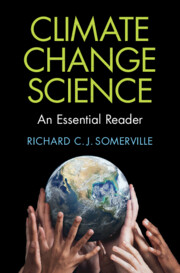Book contents
- Climate Change Science
- Reviews
- Climate Change Science
- Copyright page
- Dedication
- Epigraph
- Contents
- Preface
- Acknowledgments
- Part I Eight Articles from the Bulletin of the Atomic Scientists
- Part II Understanding and Communicating Climate Change Science
- 9 Preparation
- 10 Stories
- 11 Language
- 12 Solutions
- Part III Scientific Investigations of the Climate System
- Part IV The Future
- Appendix: Curriculum Vitae of Richard C. J. Somerville
- Glossary
- Resources: Recommended Websites and Books
- References
- Index
9 - Preparation
from Part II - Understanding and Communicating Climate Change Science
Published online by Cambridge University Press: 13 November 2025
- Climate Change Science
- Reviews
- Climate Change Science
- Copyright page
- Dedication
- Epigraph
- Contents
- Preface
- Acknowledgments
- Part I Eight Articles from the Bulletin of the Atomic Scientists
- Part II Understanding and Communicating Climate Change Science
- 9 Preparation
- 10 Stories
- 11 Language
- 12 Solutions
- Part III Scientific Investigations of the Climate System
- Part IV The Future
- Appendix: Curriculum Vitae of Richard C. J. Somerville
- Glossary
- Resources: Recommended Websites and Books
- References
- Index
Summary
An important aspect of the climate change challenge is simply that too many people rarely or never talk about it. Any issue that we refuse to talk about can quickly become one that we will do nothing about. We also know that discussing a problem can often help in solving it. Preparing well is the first step to understanding climate change well and then communicating this knowledge well. My colleague Susan Joy Hassol and I have this guiding philosophy that underlies our approach to climate science communication: Use simple clear messages, repeated often, by a variety of trusted messengers. Trusted messengers can have an enormous impact and can motivate people to bring about change. Think of Mahatma Gandhi, or Nelson Mandela, or Martin Luther King Jr. Become something of an expert yourself first, at least in certain areas of climate change science, and only then try to communicate what you have learned.
Keywords
Information
- Type
- Chapter
- Information
- Climate Change ScienceAn Essential Reader, pp. 55 - 58Publisher: Cambridge University PressPrint publication year: 2025
Accessibility standard: WCAG 2.0 A
Why this information is here
This section outlines the accessibility features of this content - including support for screen readers, full keyboard navigation and high-contrast display options. This may not be relevant for you.Accessibility Information
Content Navigation
Allows you to navigate directly to chapters, sections, or non‐text items through a linked table of contents, reducing the need for extensive scrolling.
Provides an interactive index, letting you go straight to where a term or subject appears in the text without manual searching.
Reading Order & Textual Equivalents
You will encounter all content (including footnotes, captions, etc.) in a clear, sequential flow, making it easier to follow with assistive tools like screen readers.
You get concise descriptions (for images, charts, or media clips), ensuring you do not miss crucial information when visual or audio elements are not accessible.
Structural and Technical Features
You gain clarity from ARIA (Accessible Rich Internet Applications) roles and attributes, as they help assistive technologies interpret how each part of the content functions.
